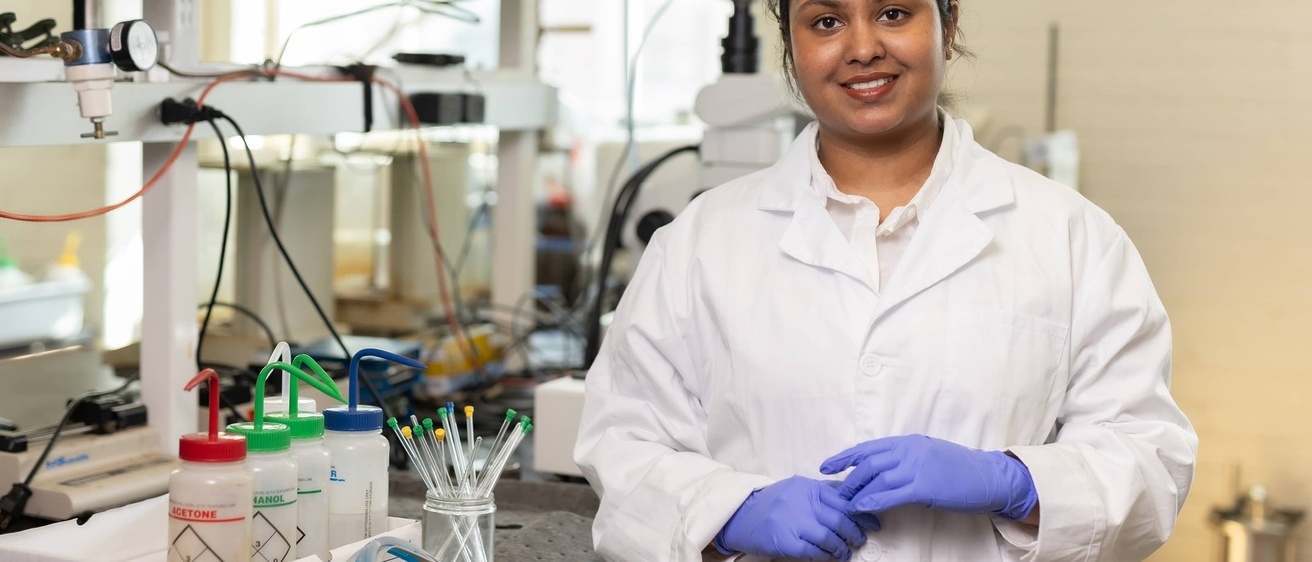Enhancing crop production
Vishuka Pathirana, a doctoral student in Chemistry and an Iowa Innovation Leadership fellow (photos by Cale Stelken).
Vishuka Pathirana, a second-year doctoral student in chemistry at the University of Iowa, addresses global issues by starting at the molecular level. With an emphasis on organic chemistry, Pathirana focuses on worldwide food sustainability by developing compounds to increase crop yield.
“Global population is rising continuously, and due to factors such as urbanization, the farmlands are shrinking,” Pathirana explains. “So, what we need to do is increase the crop productivity in the existing farmland itself.”
To tackle this issue, Pathirana develops plant fertilizers that enhance crop production. Specifically, Pathirana’s research focuses on hydrogen sulfide releasing compounds.
“Hydrogen sulfide gas has been known as a toxic gas for centuries, but scientists later discovered that under the right conditions this gas can have positive effects on plants as well as animals,” Pathirana says.
“When hydrogen sulfide is applied to plants, they have shown a positive effect, especially within extreme conditions,” Pathirana elaborates. “Also, it has shown that the plants are increasing yield with the application of hydrogen sulfide.”
Pathirana explains that current compounds used to release this gas in fertilizers release it too rapidly, at rates that are toxic for the plants. Pathirana’s research addresses this problem.
“We are making new compounds that can release hydrogen sulfide gas in a slow and controlled manner so we can get high crop productivity, and give positive effects to the plants,” she says.
Research that impacts agriculture is relevant in a state like Iowa and has a significant impact on Pathirana’s home country, Sri Lanka.
“My roots are from a country where agriculture has a great impact on the country, so that's why I thought I would combine agricultural research together with what I love, which is organic chemistry,” Pathirana says.
Within her research, Pathirana emphasizes the importance of ethical innovation, meaning that novel products and research developments have an impact that is ecologically friendly and sustainable long-term. Working within this value system, Pathirana’s research seeks to produce high crop yield while assuring environmentally sustainable outcomes.
“We make sure that the compounds are environmentally friendly and that the byproducts of the compound are environmentally friendly,” Pathirana describes.
Leadership in the lab
Pathirana is a member of The Bowden Group, Professor Ned Bowden’s lab. “Professor Ned Bowden is a very strong mentor,” Pathirana says, “and he has helped me to improve my knowledge in organic synthesis as well as my analytical skills.”
In addition to Professor Bowden, Pathirana attributes her success to the Chemistry Department’s unique facilities, her relationship with her colleagues, and her participation in the Iowa Innovation Leadership Fellows Program.
Through a year-long learning experience, the Iowa Innovation Leadership Fellows Program connects graduate students with leaders in the industry, investors, and entrepreneurs to experience what it means to create, launch, and expand the reach of a product.
“The Iowa Innovation Leadership Program cultivates leadership qualities and helps students to pave the path to their entrepreneurial dreams,” Pathirana says. “They have taught us how to transform our idea into a product, how to market the product, and how to commercialize it.”
The Innovation Fellows Program lines up with Pathirana’s goal to be on the research and entrepreneurial side of chemistry-based, product-oriented work.
“I think my greatest ambition is to become an innovator, and I would love to become an entrepreneur, to commercialize my knowledge and transfer it to an available product someday,” Pathirana describes.
While Pathirana’s current research focuses on agriculture, pharmaceutical-based chemistry research that addresses global health inequities and accessible healthcare is another area of interest for her. Through focusing on global problems at a molecular scale, Pathirana demonstrates how to engage scientific research with a business-minded outlook.
